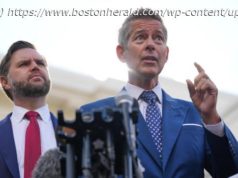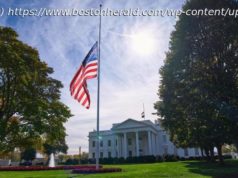In an interview conducted before her passing, Erica Garner talks about her father and her fight against police brutality.
In July 2014, when Erica Garner was 23 years old, her father was killed by police officers on Staten Island. In a video taken by an onlooker, white NYPD officer Daniel Pantaleo places Eric in a chokehold, pressing his face to the ground while he is handcuffed, as Eric repeats the phrase “I can’t breathe.” After lying motionless on the ground for several minutes, Garner was loaded into an ambulance, where he suffered a fatal heart attack en route to the hospital. He was 43.
“I Can’t Breathe” became a rallying cry for the Black Lives Matter movement. Garner’s death, and the jury’s decision not to indict Pantaleo, sparked protests in New York City and around the country. These events also turned Garner’s oldest daughter, Erica, into an activist and organizer. She staged a die-in and started holding weekly vigils months after her father’s death. She became a fierce critic of Mayor Bill de Blasio, Governor Andrew Cuomo, and Hillary Clinton, and was a surrogate for Bernie Sanders during the primary.
On Christmas Eve, Erica had an asthma attack that triggered a heart attack. She was put into a medically-induced coma and was declared brain dead on Wednesday. She died on Saturday, and is survived by her 3-month old son, Eric III, and her 8-year-old daughter, Alyssa.
This interview was conducted in mid-December, at the request of Garner, to mark the 3rd anniversary of the grand jury’s decision not to indict Pantaleo.
[The following is a condensed and edited version of the interview. The full audio can be heard here.]
Were police brutality and criminal justice reform things that you thought about before your father was killed? Did you live in fear of something like this happening to one of your relatives or loved ones?
It was talked about, but not really. We heard stories of other black men being killed, but it never hit home until the day it happened. My father always had encounters with the police. He was very adamant, especially towards the end of his life, that he was being harassed and was basically being backed into a corner — police officers on Staten Island locking him up, taking his cigarettes, taking his money or tying it up in bail, time in jail even, for something so small as selling cigarettes. If you look at the video: before he said “I can’t breathe,” he was basically asking them to leave him alone.
People that were there said that he didn’t even have cigarettes that day. He was trying to make peace between two people that were fighting. My father is the peacemaker. How did you learn about what had happened?
At the time I was working in Long Island City. And my sister had called me, frantic, and told me she didn’t know what happened, just that my father had stopped breathing. I figured maybe he was on the way to the hospital, but my mom wasn’t answering the phone. No one answered the phone. So it was a while before we found out what happened. Later on that night, a person from the Daily News told me there was a video. So that night me and my brothers and sisters sat around the computer and we watched that brutal video of my father being murdered.
What was that like?
It was hard. It was heartbreaking. It was shocking. I remember feeling dizzy, nauseous There was something that you couldn’t describe. We just broke down and started crying. It’s very heartbreaking. I’ve seen the video over a thousand different times. It’s something that I viewed as a case study, because I want to know every aspect of what happened that day. Can you tell us what you are up to right now?
Right now, I’m in the process of starting a 501c3 non-profit. I want to focus on organizing and endorsing candidates to spread their message about the movement. And also have panels to discuss the topic of police brutality and policy, and also hopefully one day start programs in schools to just keep our youth engaged. Maybe start an independent podcast and news outlet to get the word out there.
Something I’ve noticed about your advocacy is that you make the connection between police brutality and other things like, as you just said, education. Can you talk about the connections between police brutality and other issues?
Yes. I’ve been working tirelessly — from protesting to talking to people in Congress and state senators — trying to get people to look at the connection between police brutality and policy. We are not educated about this in school. A lot of people don’t even know the steps to pursuing justice.
Did you have experience as an activist and organizer before your father’s murder or was that the thing that turned you into an organizer?
No. It was something that happened basically overnight. I had no idea what I was doing, but I connected with the right people and went from there. I started out with protests, small little gatherings outside the post office, then gradually graduated from that to weekly protests at the spot where my father was actually murdered and then at the police station. And then I traveled to different cities to talk about this issue with local communities and elected officials.
I’d seen a lot of people doing die-ins around the world, activists from different countries showing solidarity. And I felt like I had to go to the spot and lay in that spot to send a message. I don’t know how to describe it — it was a very emotional thing for me to actually be in that spot and lay in the same spot that he died in. I did that Tuesday and Thursday for like about a year, the first year that everything happened.
A lot of people started reaching out after that. That’s when I started traveling and speaking to other activists and other organizations.
What was Mayor de Blasio’s response?
In the beginning, it seemed like he was very supportive. For the first two years, he stood with Reverend Al Sharpton, who is an advisor for my family, in support of changes in policy. De Blasio actually sat with my grandfather when the [non]indictment came down three years ago. My grandfather was so emotional, crying and couldn’t believe it. [de Blasio] called my grandfather aside, in the church, to console him and talk to him.
But this year, for the anniversary, he refused to even speak my father’s name. He stood with police officers to open up a new police station out in Staten Island on the day that my father was killed. I feel like he’s pandering to police. During his first term he lobbied and promised us New Yorkers that Stop and Frisk policy would come to an end, but it’s just been reformed into Broken Windows policing, which is basically the same thing, and which led to my father being killed that day.
He refuses to punish the officers who killed my father, especially Danny Pantaleo. He says he’s waiting for the federal government to do their investigations before he makes a decision, but I just think that he’s holding off to satisfy police officers.
Bill de Blasio has served one term and he’s going to serve a second term. Do you have any hopes that he will do more about your father’s case and about police brutality in general given that he won’t be up for re-election?
I’m hoping that he’ll hear my cries and the city’s cries about having better relations with the local police officers, and not being afraid we’ll die when we encounter them. But I believe that it’s going to be more of the same.
What’s your response to people who say, “What can he do? He doesn’t have a choice. NYPD officers turned their backs on him at officers’ funerals”?
He’s supposed to be our mayor. [His actions] shouldn’t be just [determined by the fact that] police officers are turning their backs on him, or by being afraid of losing police officers’s support or whatever. You know if anyone should know what the right thing to do is it should be him, a man with a black child, who has ties to a black family.
What are your thoughts about Mayor de Blasio’s refusal to make the chokehold illegal? He says it’s unnecessary, since it’s already against police policy to use a chokehold. But clearly that’s not a significant deterrent. Pantaleo used it. Were you surprised that he didn’t get behind criminalizing chokeholds, making them punishable by a fine or jail?
I believe that he’s blocking any type of justice my family’s seeking — whether it’s the Chokehold Bill, the Know Your Rights Bill, or even a recommendation from the Civilian Complaint Review Board.
The [CCRB] recommended that Daniel Pantaleo’s records be released and de Blasio has also refused to do that, right?
Yes. Though a source from the CCRB leaked them, so I got to see them. I also filed a FOIA request right around my father’s death. A couple of weeks after the leaked information I got a letter in the mail from the city stating that the CCRB found that the fact that he used a chokehold was substantiated and that Pantaleo had a previous complaint against him that was also substantiated. Still, nothing has been done.
Pantaleo’s been getting raises for the past three years — more than $100,000. He’s still working. And that’s it. He’s just got more money. more money and no punishment.
But I think we should start from the bottom and go all the way to the top because it’s not just one person. Matt Taibbi interviewed someone from the police side and basically the order was coming up from the higher ups saying that my father was a problem.






